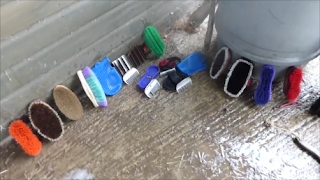Hygiene is perhaps not your first thought when you look at an outdoor, muddy yard. However, reducing the chances of your horse suffering from an illness or infection is something you certainly should have in mind. If you keep your horse on a livery yard or at a riding school then they should have a plan and measures in place to reduce the chance of a disease spreading. Obviously, if you keep your horses at home or independently from others you have much more control . Whichever situation you are in there are things you can do.
What can you do?
As owners we can improve the immunity of our horses to help them resist infection and reduce the chances of them introducing or spreading a disease.
Vaccinations: - ensure your horse is up to date with his vaccinations. In the UK Tetanus and Equine Flu are a must but you can also immunise for Strangles and Herpes. Don't allow your horse to succumb to a preventable disease!
Pest Control: - ensure horse feed is kept in rodent proof containers. Sometimes plastic bins are not enough as rats have been known to chew through these, in these situations metal ones are the only answer. Sweep up any spilled feed as easily accessible food will attract rodents. Have a cat or use poison to deter them. Rat urine can make your horse very, very ill if ingested and that is easily done if a rat urinates on some hay!
Prevent Access to Stagnant Water: - this is always a breeding ground for nasties so where possible eliminate these areas. If this is not possible and you have an area of standing water in the field or yard ensure your horse cannot access it.
Grooming Kit:- don't share brushes or use someone else's kit. Wash your brushes and if your horse has an infection or skin disease then make sure they are disinfected or replaced.
Bits and tack:- always wash your bit and keep your tack clean and in tip top condition. If your tack rubs it leaves an entry point for infection. This applies with rugs too, make sure they fit well so that they don't cause rubs.
Manure:- make sure you clear your field of manure regularly and dispose of the muck heap safely and regularly. Don't allow your horse access to the muck heap.
TPR:- know your horse's normal temperature, pulse and respiration rate so that you can identify if there is something wrong.
Observation: - know the signs of diseases and illnesses so that you can act quickly if he may have an infectious disease.
Skin:- work hard to prevent your horse getting skin problems, mud fever, sweet itch and rain scald all provide ease of access for infection and bacteria.
Wash your hands: make sure you wash your hands with a good anti - bacterial soap before touching wounds. Don't touch one horse's eye and go straight to touching another's eye.
Shows: - if you take your horse to shows or other places where horses gather don't let your horse sniff or touch another horse. Don't let them share another horse's water or touch another trailer or horse box either. If you use stabling make sure you disinfect it fully to ensure there are not bacteria or viruses left to infect your horse.
Vet's/Farrier's/EDT's:- make sure other people that touch your horse have washed their hands or used an anti-bacterial gel or disinfectant scrub if they have just been handling another horse.
Wounds:- make sure you deal with wounds, cuts etcetera to prevent infection. Have a look at my previous blog for guidance.
Keeping our yard, stable and equipment clean and well maintained are a good way to reduce the chance of our horse becoming ill through infection or viruses. Livery yards or riding schools should have quarantine areas for horses with potential diseases or viruses. Be vigilant and check your horse everyday.
Did you see last week's video 'Cleaning the stables and a Tommy Surprise' on my You Tube channel. Horse Life and Love. Please check it out and SUBSCRIBE.
You can also follow me on Facebook and Instagram for updates on Chesney, Basil, Tommy and Daisy.
Until next time!
Jo




No comments:
Post a Comment